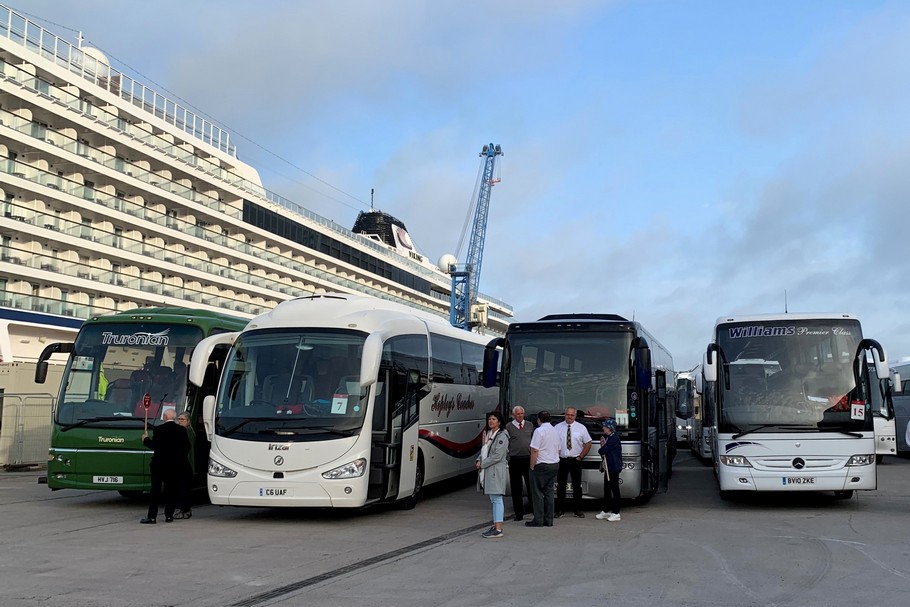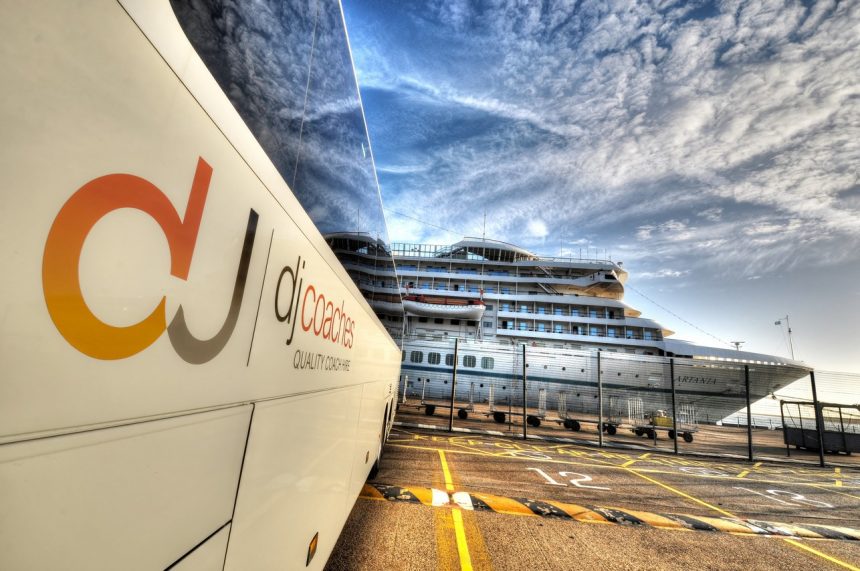The continued growth in the popularity of UK cruising is generating increased demand for coaches to provide shore excursions. But how does the process work and how are operators responding to that workload?
For many coach operators around the country, providing coaches to meet cruise ships arriving at UK ports has long been an important part of their day-to-day business.
A coach operator will usually work with one or more ground handling intermediaries, companies such as Intercruises, Excursions, Communications and Destinations, and others.
These intermediaries will usually work with specific cruise lines, contracting coaches to provide shore excursions and hotel and airport transfers, as well as hiring Blue Badge Tourist Guides.
All of this makes life easier for the coach operator which, in turn, is required to provide a clean, quality coach and smartly turned out drivers. There’s also a requirement for that most important element for any shore excursion with a guide, a working, trailing microphone. Hire rates are usually set by each coach operator, with pro-rata rebates should a ship be unable to call at a port because of bad weather. In addition, outside of the operator/intermediary process sit tour operators offering independently-bookable shore excursions.
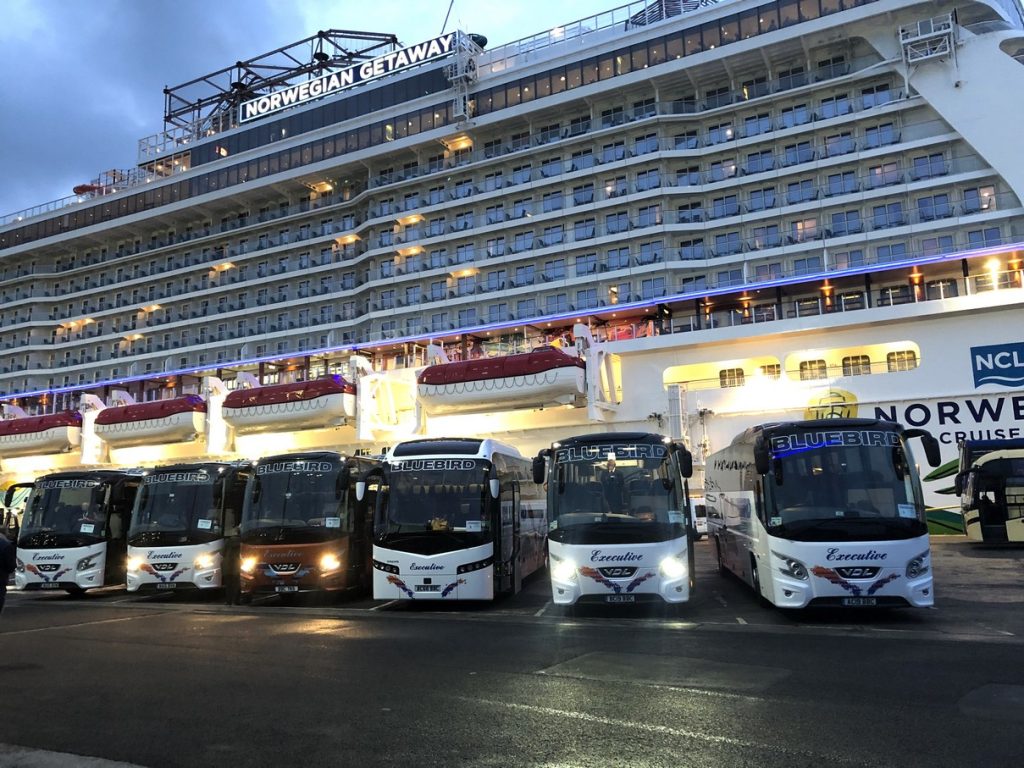
Berth capacity is a key consideration
It can come as a surprise to find there are more than 50 cruise ports dotted around the UK. It means a wide range of coach operators are actively involved in this sector of the industry.
Matt Blanks is Director of Gravesend-based DJ Coaches.
“Our cruise business came back in full early in 2023,” he says. “This year has gone crazy! We mainly provide coaches for shore excursions at Dover and Southampton. There are more cruise ships now, but limits on berth capacity mean arrivals have to be spread out. That works well for us. At Dover, most of our work is taking cruise passengers up to London for a day. It’s good work and a good clientele.”
In Dorset, Weymouth-based Bluebird Coaches is benefiting from increased demand through Portland, originally a military port, but a cruise port for the last nine years or so.
“A large cruise ship can disgorge 5,000 passengers,” explains Tours Manager Steve Ring. “That means the intermediary needs to hire in coaches from a very wide area. We always send our top tour coaches.”
However, the issue of short term cancellations has meant Bluebird has had to reassess how it works with the intermediaries.
“In the early days we used to commit a large number of vehicles,” says Steve. “But if the weather was bad and a ship couldn’t dock, we found we weren’t getting paid. By the time we found out that we weren’t needed it was too late to find other work, but our drivers still needed to be paid. It’s important for a balance to be struck with our other clients, so we no longer commit up front to as many coaches as we used to. However, the positive relationships we have with our intermediaries means they know they can call upon us at the eleventh hour if needed.”
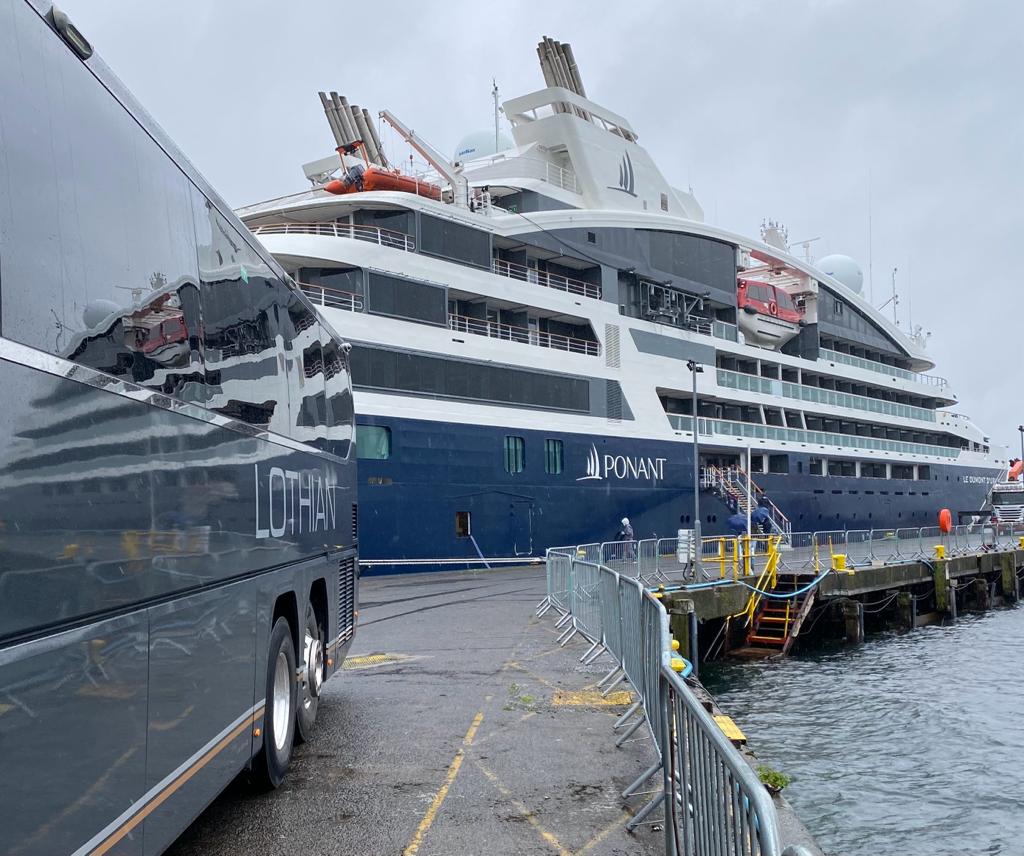
Can destinations cope?
In Scotland, Edinburgh-based Lothian Motorcoaches understands the importance of the relationship with the intermediaries.
“The more we work together the better,” says General Manager Kevin Slater. “We provide coaches at Leith, Newhaven, South Queensferry, Rosyth and Greenock. Our intermediaries are looking for conformity and quality. We have DVSA Earned Recognition accreditation as well as an in-house coach driver training programme with a three-month assessment process.
“The intermediaries say this gives them confidence in the service we offer. It all scores in our favour. Like most ports, it’s the port staff who will supervise the marshalling of coaches. At Newhaven, which is a small port to the west of Leith, we organise the marshalling offsite, and then feed the coaches in as required.”
Kevin highlights another issue. “The market is still growing, but that growth, and what it means for us will depend on how ports adapt. But can destinations cope with bigger or more ships? Edinburgh would struggle. Coach parking in the city on the busiest days is already an issue.”
In Liverpool, the arrival of a large cruise ship can see up to 25 coaches needed at the cruise terminal. “It’s good work for us,” says Gary Alderton, Traffic Manager with Birkenhead-based Happy Al’s Coaches, one of many operators servicing the port.
“We get told where the coaches are going, perhaps a day out to Chester or Conwy, or a traditional Beatles tour in the city. In most cases it’s the tour guide who will direct the driver. That can be useful if we need to use a new driver or one who isn’t familiar with the destination.”
Stuart Rawlinson has been a driver with Happy Al’s for 15 years. “The port marshals are really helpful,” he says. “We can phone them if we get caught in traffic. You then meet the tour guide and we run through the itinerary together. I enjoy the work. The passengers are really diverse.”
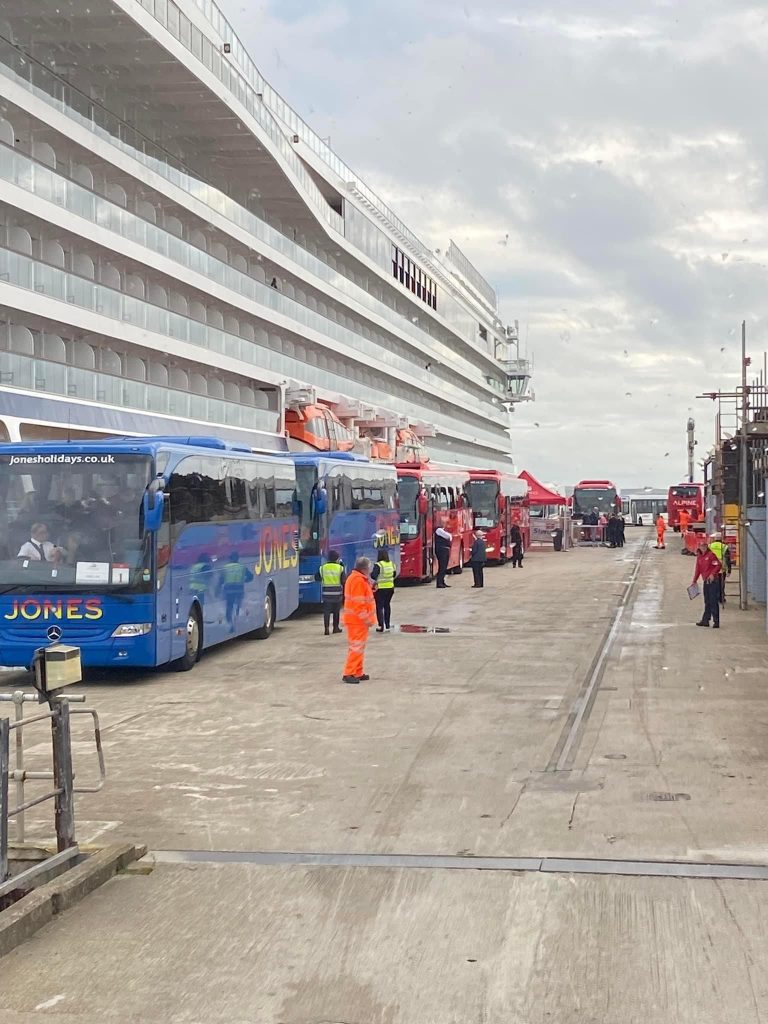
A different approach
In North Wales, Llandudno-based Alpine Travel is a major provider of coaches at Holyhead where around 60 cruise calls are expected this year.
“We use intermediaries for shore excursions,“ says Managing Director Chris Owens. “But we also act as an intermediary ourselves for one cruise line. It’s all about relationships and experiences. We provide that cruise line with a one-stop shop, everything it needs.”
Chris is Treasurer with Cruise Wales, an organisation that actively promotes the country to cruise operators.
“Cruise hires are a significant piece of business for us,” he says. “We could end up providing up to 28 coaches for one ship. However, we also share work out with other local operators. For us, it’s important we work well with everyone.”
Chris notes that only around half of passengers on a ship might have booked shore excursions.
“It’s crucial that we know the numbers in advance,” he says. “A big vessel can take up to two-and-a-half hours to decamp its passengers. We try to maximise efficiency but also remain flexible.”
Chris also praises the work being done by the intermediaries.
“Around 50% of the price a cruise passenger pays for a shore excursions stays on the ship,” he explains. “The rest finds its way to the shore excursion intermediaries, who have to cover their costs, including hiring in coaches and tour guides. Across the country, the intermediaries do a really good job managing all of this.”
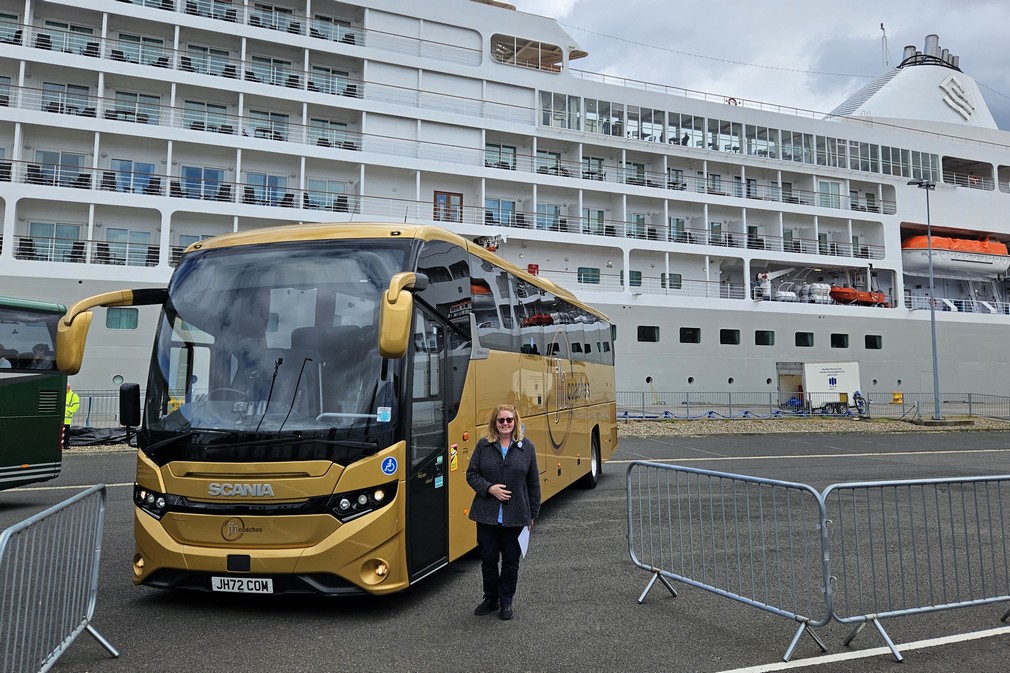
More enquiries
Plymouth-based Tamar Coaches provides coaches for Falmouth, Plymouth, Torquay, Dartmouth and Portland.
“This year has certainly seen an increase in enquiries and bookings,” says Operations Manager John George-Andrew. “We can often have 10 coaches at Plymouth and four at Falmouth, with full-day tours heading to Dartmoor or the Eden Project.”
The increase in enquiries is echoed by John Shipley, Managing Director of JH Coaches of Chester-le-Street.
“At the moment, cruise work is a small part of what we do,” he says. “But the number of port calls we attend is increasing. The way we look has helped and continues to help us get more work.”
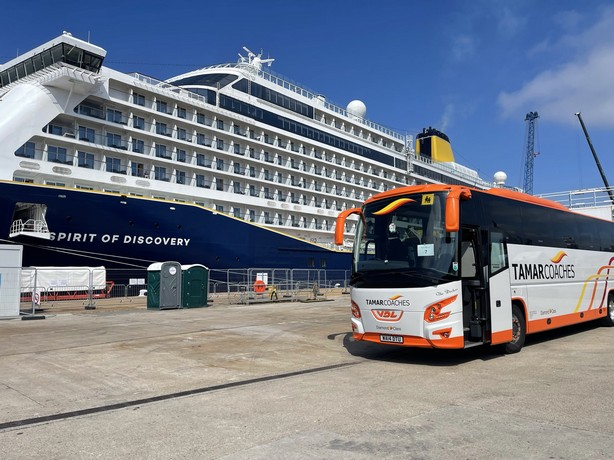
Significant numbers
In the north of Scotland, Kevin Mayne, Managing Director of Maynes Coaches of Buckie, notes the challenges.
“During COVID-19 I was keen to highlight to government how important coaches are for the cruise industry,” he says. “Kirkwall, in Orkney, can take three large ships at a time, disgorging up to 6,000 passengers in a day. We have an outstation there. In Orkney there’s a move to reduce the number of ships arriving on any one day and spread port calls out over a number of days. That’s will mean more work for us. The figures speak for themselves. Inverness welcomed around 4,000 coaches in 2023, the bulk of which were on shore excursions from Invergordon.
Final word to Anthea Desmond, Senior Vice President Operations with intermediary Excursions Ltd.
“We manage some 900 port calls across the UK in a year,” she says. “The remoteness of some ports presents challenges in finding enough coaches. But we do. Across the UK we do work with some excellent operators.”
